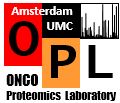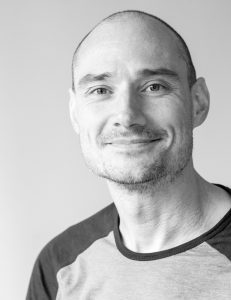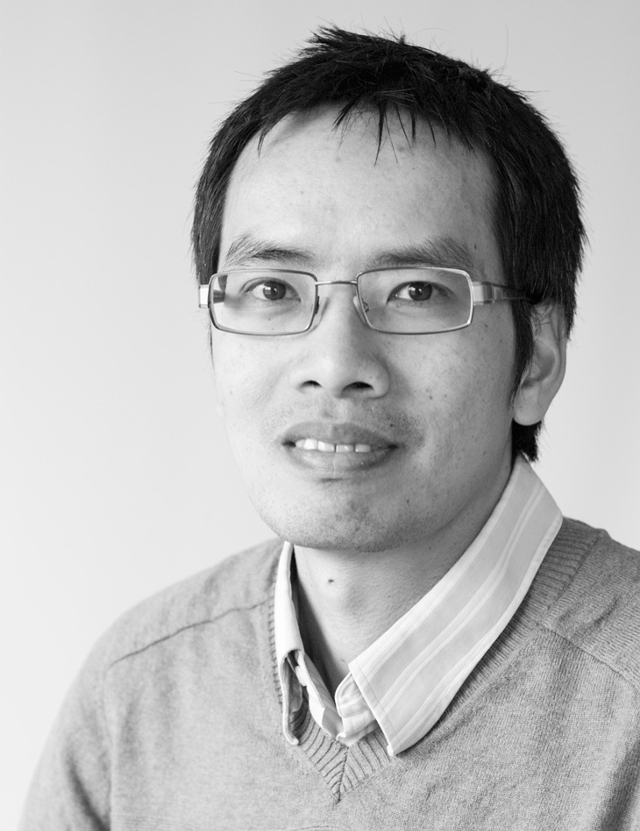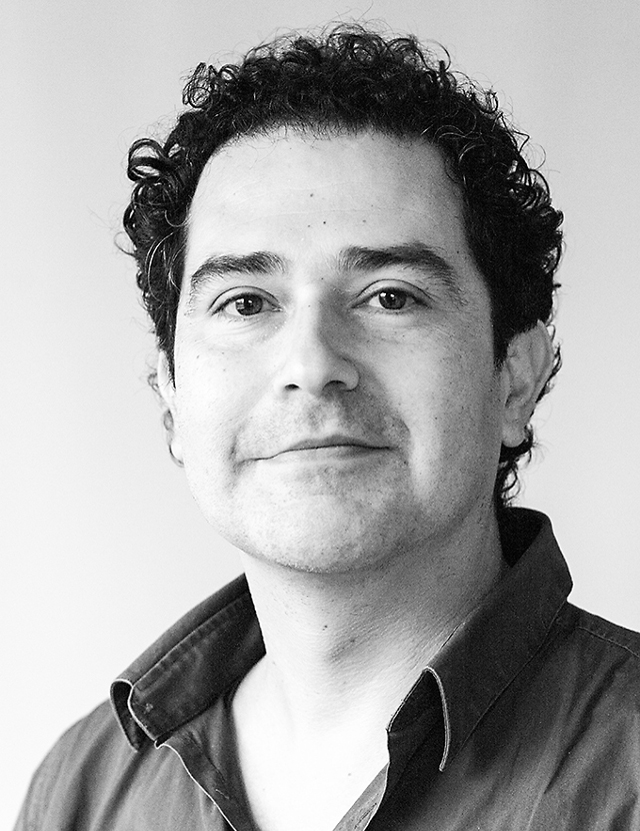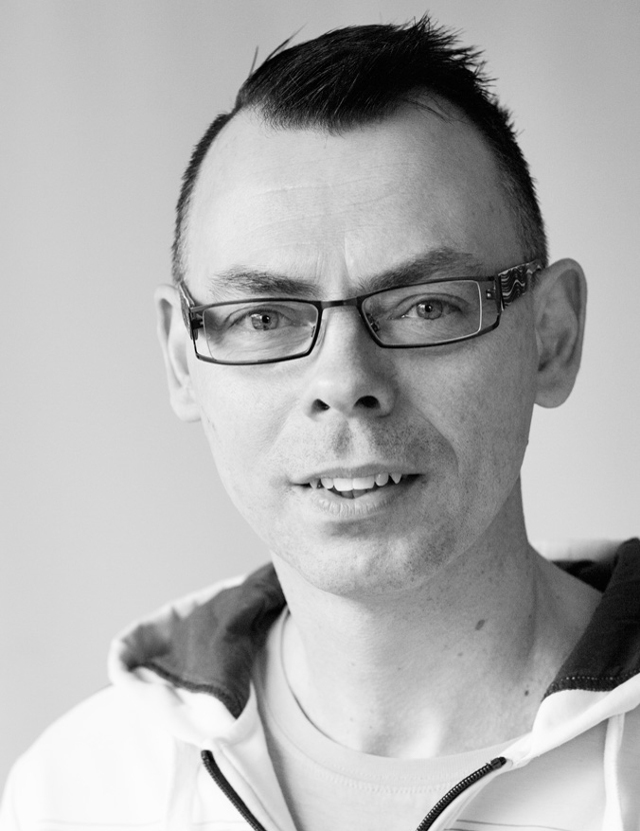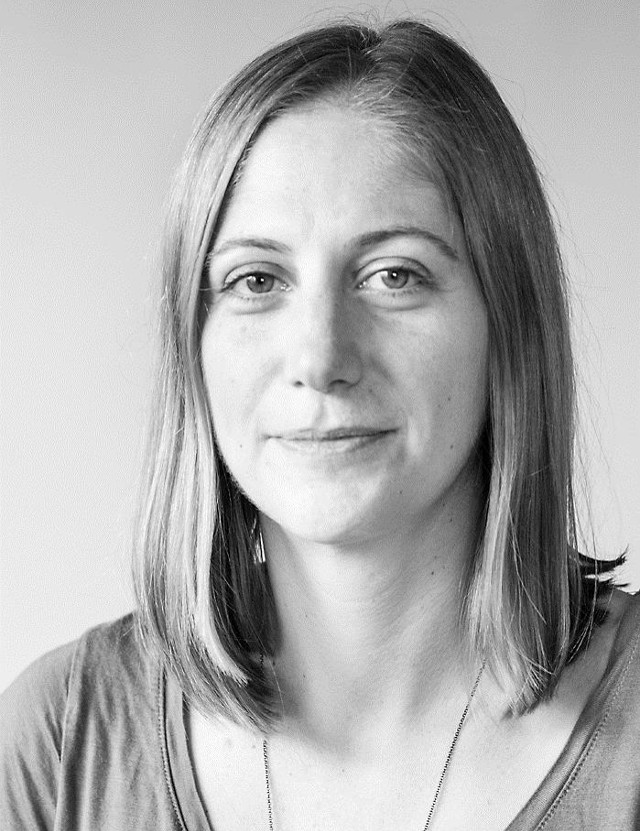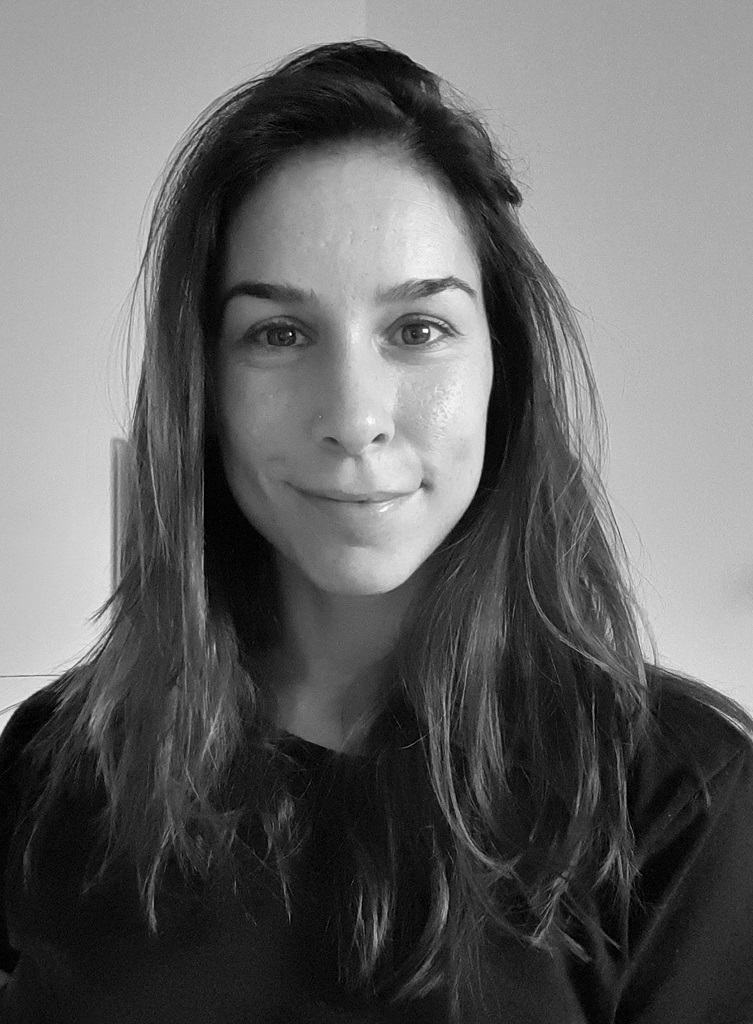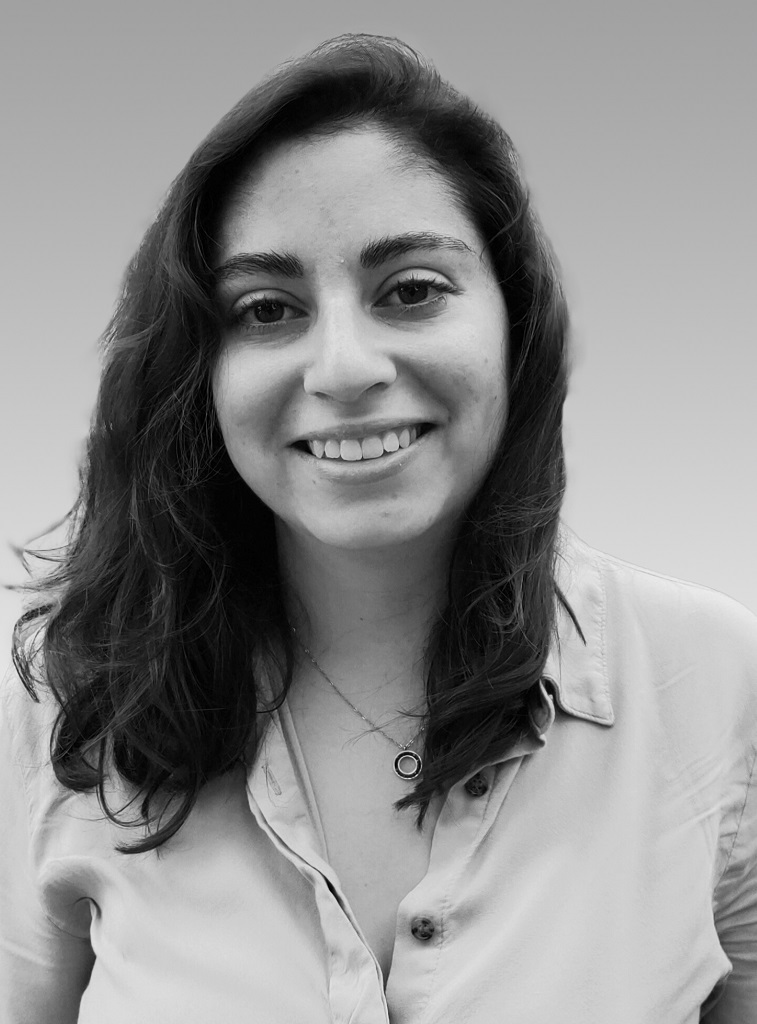- Current Team
- Affiliated / Clinical
- Insternships & Guests
- Collaborator Quotes
- Former Members
- Former Internships & Guests
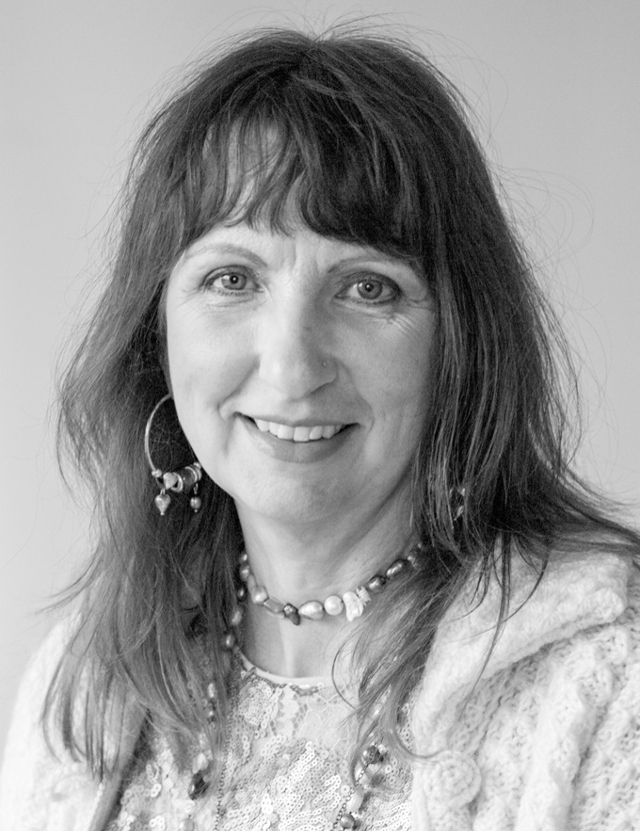
Prof. Dr. Connie R. Jimenez
Head
Mariette Labot, M.D., Ph.D. (VUmc Dept. Medical Oncology)
Clinical member in the team effort to develop phosphoproteomics-based applications for patient selection for targeted therapy
Irene Bijnsdorp, Ph.D. (VUmc Dept. Urology)
Affiliated member in the team effort to develop exosome-based diagnostic for prostate cancer
2025 – Luke Pattiwael, Internship Master Biomolecular Sciences, VU
Project: Proteomics of extracellular vesicles for biomarker discovery in renal cancer
2025 – Risheet Lai, Internship Master Biomolecular Sciences, VU
Project: Plasma (extracellular vesicle) proteomics for biomarker discovery in ovarian cancer
What do our collaborators say about the OPL?
Quotes from CCA collaborators:
Dr. Jacqueline Cloos, Dept. Hematology, collaborator since 2012:
“De afdeling Hematologie heeft samen met het OPL een aantal mooie studies lopen waar al heel interessante data uit zijn gekomen. Kroon op het werk is een artikel in Molecular and Cellular Proteomics waarin we laten zien dat leukemiecellen blaasjes uitscheiden met daarin met name eiwitten betrokken bij splicing. In een ander succesvol project karakteriseren we specifiek het tyrosine fosfoproteoom van verschillende leukemiecellen om aan de hand van deze profielen de juiste kinase remmers te selecteren voor het behandelen van de patiënt. Naast de technische support bij de experimenten krijgen we gelukkig ook veel support voor de data analyses om de biologische significantie te vinden in de grote datasets.
Omdat de (gefosforyleerde) eiwitten veel zeggen over de functionele processen in de cel is proteomics een mooie aanvulling op de genomics en transcriptomics en zullen we ook in de toekomst nog veel gebruik maken van deze faciliteit.”
Dr. Linda Smit, Dept. Hematology, collaborator since 2014:
Mijn onderzoeksgroep is op zoek naar eiwitten die gebruikt kunnen worden als therapie doelwitten en de terugkeer van leukemie kunnen voorkomen. De proteomics faciliteit geleid door Connie Jimenez heeft al een fantastische bijdrage geleverd aan dit onderzoek door proteomics te doen op de cellen die verantwoordelijk zijn voor de leukemie terugkeer. We hebben op deze manier al verschillende eiwitten geïdentificeerd die mogelijk gaan leiden tot een nieuwe therapie die de overleving van leukemie patiënten gaat verbeteren.
Dr. Michiel Pegtel, Dept. Pathology, collaborator since 2007:
De Exosomens research group (ERG), is een multidisciplinaire onderzoeksgroep van het VUmc die internationaal bekend staat om baanbrekend onderzoek naar exosomen en de rol die deze nanoscopische vetblaasjes spelen in kanker en autoimmuniteit. Sind de start van dit laboratoriumonderzoek zijn met behulp van massaspectometrie en innovatieve data-analyse methodes met behulp van en ontwikkeld door het OPL verschillende nieuwe fundamentele inzichten verkregen. Recent heeft dit geleid tot een publicatie in PNAS waarin werd aangetoond met massaspectometrie dat RNA-bindende eiwitten een inhiberende rol spelen in ontstekingen veroorzaakt door uitgescheiden RNA moleculen. Tevens is met behulp van de kwantitatieve analyse methode van het OPL ontdekt dat druggable ‘membraan fusie’ eiwitten oncogenese bevorderen omdate deze ongecontroleerde exosomen productie in kankercellen ‘aan’ zetten. Het is de verwachting dat door middel van nieuwe isolatietechnieken mede ontwikkeld door het ERG in combinatie met gevoelige eiwit detectie technieken van het OPL nieuwe diagnostische testen kunnen worden ontwikkeld voor kanker en auto-immuniteit met een superieure sensitiviteit en specificiteit.
Dr. Irene Bijnsdorp, Dept. Urology, collaborator since 2012:
Research of the Dept. of Urology focusses on protein marker identification for detection and stratification of prostate cancer patients into risks groups. To this end we analyze small extracellular vesicles (exosomes) that have emerged as biomarker-rich treasure troves. Together with dr. C. Jimenez of the OPL, we profiled the proteome of urinary exosomes leading to the identification of over 3000 proteins. This is much more than has been identified before by others (usually not exceeding 1500 proteins). Initial proof-of-concept proteomics profiling led to the improvement of exosome isolation of urine EVs. Furthermore, after data mapping and key (bio)statistical support provided by the OPL-group, led to the identification of potential PCa biomarkers. This work was the basis for the financial support (KWF, Alpe d’Huzes) of a collaborative project together with Prof. Jenster (Erasmus MC) and Prof. Schalken (Radboud UMC). This project will take advantage of the excellent infrastructure and expertise in exosome-proteomics (Dr. Jimenez) and it is expected that this project will provide a strong basis for developing a liquid biopsy-based diagnostic/prognostic test for PCa.
Prof. Ruud Brakenhoff, Tumor Biology section of the Dept. Otolaryngology-Head and Neck Surgery, collaborator since 2010:
The Tumor Biology lab focuses its research on the diagnosis and treatment of patients with tumors in the upper aerodigestive tract. Using genome-wide siRNA screens we identified a variety of novel molecular targets that might be exploited to improve future therapy protocols, combined with standard first line treatments. One of the major research efforts is to elucidate the molecular pathways these drug targets act in, and using (phospho)proteomics approaches both primary and secondary substrate proteins can be identified, and the effects of inhibitors analyzed. This was recently published for the MASTL protein, a kinase that sensitizes lung cancer cells for radiotherapy (Nagel et al. Mol Cancer Ther 2015). This work will certainly be followed up for targets and inhibitors being studied, and proteomics and phosphoproteomics are the ideal pipelines for such studies.
Dr. Josephine Dorsman, Dept. Clinical Genetics, collaborator since 2010:
“Het is goed om in-huis een kOPLoper in protemics te hebben, om nieuwe inzichten & OPLossingen te vinden voor basale en translationale vragen. Ook daadwerkelijk gebeurd in samenwerking: Fanconi & Zuurstof tolerantie ! Omdat het juist de eiwitten in de cel zijn die het werk doen, verwachten wij dat het OPL onderzoek nog veel gaat OPLeveren in de toekomst.”
Dr. Rob Wolthuis, Head of the Oncogenetics Labs, Dept. Clinical Genetics, collaborator since 2015:
“In the era of cancer -omics, we see two critical developments: the first one is directed at resolving biological and clinical implications of cancer mutations. Already at an early stage, Connie Jimenez started to address these by effectively exploiting a combination of cancer genomics and proteomics. Secondly, there is an enormous need for new combination therapies that could overcome drug resistance associated with targeted mono-therapies. This absolutely requires advanced molecular pathway analyses and functional kinase studies, which are technically very challenging. The Jimenez lab has generated powerful new assays for rapid phosphoproteomics and links them to state-of-the art bioinformatics, a great combination. With these expertises in full operation, the lab functions at a state-of-the-art international level now, and has tremenduous value for cancer research at the CCA. We look forward to continuing our various research lines with the OPL"
Dr. Juan Vallejo, Dept. Molecular Cell Biology & Immunology, collaborator since 2015:
“At the group of Dendritic Cell Immunobiology we focus on the role of glycan-binding receptors on the modulation of immune responses and their potential use as targeting receptors for anti-cancer vaccination. One of the most interestign features of these broad family of receptors is that, besides mediating efficient antigen uptake, they also trigger intracellular signaling that modulatest dendritic cell activation. However, the nature of the signaling events involved in this pathway remains only partly uncovered, and next generation phosphoproteomics will be extremely useful in shedding light on this processes.”
Prof. Wilbert Bitter, Dept. Medical Microbiology, collaborator since 2006:
“The proteomics facility of the OPL has been crucial for our work on the tubercle bacillus. We have generated various secretion mutants and the detailed proteomic analysis of these mutants has shown important new insights in the working of this major pathogen. The high-end equipment and expertise of the OPL researchers in the data processing helped us to place ourselves in the forefront of tuberculosis research. Especially because some of the most important proteins turned out to be extremely challenging to capture by proteomics. This work has resulted in 8 publications including papers in PloS Pathogens and PloS Genetics, as well as in new strategies for vaccine development.”
Prof. Arjan Griffioen, Dept. Medical Oncology, collaborator since 2014:
‘The Oncoproteomics Laboratory very successfully assisted several projects that are currently running in the Angiogenesis Laboratory. Proteomics approaches were applied in the search for alternative isoforms of the tumor vascular marker vimentin and for the discovery of diagnostic biomarkers present in cancer patient thrombocytes. The expert collaboration has been efficient, fast and successful. A future collaborative project will focus on the mechanisms of targeted combination therapy by phophoproteomics.’
Drs. Mariette Labots M.D., Dept. Medical Oncology (clinical staff), collaborator 2012:
Als medisch oncoloog leg ik patiënten met uitgezaaide kanker dagelijks uit hoe targeted therapies werken. En ook dat we op voorhand niet weten of de behandeling wel zal aanslaan, of, dat als deze blijkt te werken, op termijn meestal toch ongevoeligheid zal ontstaan. Vaak vraag ik om toestemming voor het nemen van een tumorbiopt voor onderzoek: omdat we samen met het OPL hard werken aan een (fosfo)eiwittest om in de toekomst te kunnen bepalen welke signaleringsroutes actief zijn in de tumor, om hiermee de meest geschikte behandeling te kunnen selecteren voor een individuele patient.
Zo hebben we in de afgelopen jaren de voor personalized medicine veelbelovende fosfoproteomics-technologie toepasbaar weten te maken op maar een heel klein stukje tumorweefsel van patienten. Dit maakt verdere ontwikkeling van deze technologie voor de klinische praktijk mogelijk. Ik ben er van overtuigd dat (fosfo)proteomics een belangrijke bijdrage zal leveren aan het realiseren van therapieselectie voor individuele patienten.
De samenwerking met het OncoProteomicsLab is inspirerend, snel en biedt mede door de inbedding binnen de afdeling medische oncologie veel mogelijkheden voor translationeel onderzoek. De onderzoeksfocus binnen het OPL-lab naar het toepassen van fosfoproteomics voor personalized medicine is uniek in Nederland. Connie Jimenez weet mede dankzij state-of-the-art apparatuur de snelle ontwikkelingen binnen dit onderzoeksveld bij te houden en neemt hierin ook internationaal een voortrekkende positie in.
Prof. Tanja de Gruijl, Dept. Medical Oncology, new collaborator:
“The immunotherapy lab, in a VUmc/AMC Alliance collaborative project with the lab of Prof. Theo Geijtenbeek, is studying ways in which to optimally leverage autophagy in melanoma, in order to boost T cell immunity in vivo. Together with the Proteomics lab we hope to asess the protein content of differentially generated autophagosomes for their immunogenic potential, both in terms of (neo-)epitopes and immune stimulatory signals.
In addition, in our search for predictive immune biomarker profiles in patients treated with immunotherapies, targeted therapies and even more conventional chemo- or radiotherapies, we hope in future to translate systemic phenotypic immune effector cell subset signatures to (phospho)proteomic signatures, building on the technical know-how and unique expertise of Dr Jiménez and her lab."
Quotes from non-CCA VUmc collaborators
Dr. Charlotte Teunissen, Dept. Clinical Chemistry, collaborator since 2005:
“Het OPL heeft een grondige en zeer betrouwbare workflow opgezet voor liquor proteomics. Hiermee hebben we verschillende studies kunnen doen, waardoor we inzicht gekregen hebben in het liquor proteome, en nieuwe kandidaat biomarkers ontdekt hebben. Hierdoor hebben we zowel diagnostische en mechanistisch/pathologische vervolgstudies kunnen uitvoeren.”
Prof. dr. Jolanda van der Velden, Dept. Physiology, collaborator since 2015:
Prof. Jolanda van der Velden, Dr. Diederik Kuster and Maike Schuldt study determinants of disease progression in genetic cardiac disease within a reserach consortium, which is funded by the Netherlnads Heart Foundation (CVON-DOSIS):
The proteomics facility of the OPL is key in identifying cellular pathways that are centrally involved in disease progression in hypertrophic cardiomyopathy. Proteomics analysis has been performed in cardiac tissue samples from 60 genotyped and clinically well-characterized patients. We expect to report our results in a joint publication in 2018. The identified disease modifiers will be tested in functional assays to establish their exact role in cardiac disease.
Quotes from external collaborators
Prof. Gerrit Meijer, Dr. Remond Fijneman, NKI, collaborator since 2006:
“10 years of OPL = 10 years of collaborative and successful CRC research: congratulations! The OPL turned in-depth protein profiling of colorectal tumors into a reality, which added a new dimension to our research. Major achievements: The collaborative research with OPL has yielded many protein biomarkers, and has boosted research for early detection of CRC. Near future work: The OPL enables antibody-independent validation of protein biomarkers, thereby bridging the gap between biomarker discovery and assay development for clinical applications. The pleasant atmosphere around the OPL offers an inviting environment for Master students, PhD students, and postdocs to learn what proteomics is about.”
Prof. Onno Kranenburg, UMCU, collaborator since 2007:
“The Kranenburg research group aims to devise novel therapeutic strategies aiming to prevent and effectively treat metastasis in CRC, in part by targeting cancer stem cells. The OPL has been instrumental in elucidating drug resistance mechanisms in CRC stem cells, which has resulted in the publication of 6 co-authored papers in high-impact journals in the cancer and proteomics domains. We have recently further identified novel targets for therapy that drive tumor growth and metastasis in the most aggressive (mesenchymal/stem-like) CRC subtype. In addition, we have developed a diagnostic tool allowing us to select such patients for targeted therapy. We hope to renew our collaborations with the OPL in ‘proof-of-concept’ clinical and organoid-based studies as (phospho-)proteomics-based evaluation of drug response will be an essential part of future trial design.”
Prof. Jos Jonkers, NKI, collaborator since 2007:
“The focus of our group is on the genetic dissection of human breast cancer through the use of advanced mouse models. In the past 9 years, our collaboration with the OPL has given us insight into the proteome of our genetically engineered mouse model for BRCA1- and BRCA2- associated hereditary breast cancer. The results of this fruitful collaboration have been published in 2 papers in the nr 1 proteomics paper in the field, Molecular and Cellular Proteomics and a joint KWF project. Currently we are using phosphoproteomics on our patient-derived xenograft models for homologous recombination repair deficient breast cancer. First pilot results have been very promising and I look forward to the results of this continuing joint discovery.”
Prof. Jan Paul Medema, AMC, collaborator since 2014:
“One of LEXOR’s research lines focusses on colorectal cancer prognosis and response to therapy. We identified biologically subgroups with highly distinctive gene expression patterns and clinical features, which includes a subtype with dismal prognosis. In collaboration with the OPL we are currently unravelling the proteome complement of these CRC transcriptome-based subtypes. We obtained promising, in-depth proteome data of the AMC colon tumors that may pave the way to novel immunohistochemical test. Together with also ErasmusMC, UMCU and RadboudMC, we obtained funding from KWF/ Alpe d’Huzes that will enable us to expand the CRC proteome dataset and to translate these findings into a clinically applicable test.”
Prof. Jacco van Rheenen, Dept. Cancer Biophysics, Hubrecht Institute, collaborator since 2015:
“Our lab is a world-leader in the high resolution in vivo imaging of the behavior of cells in living mice. Last year, using in vivo imaging, we have shown how malignant tumor cells can phenocopy their behavior to more benign cells through extracellular vesicles (Zomer et al, Cell 2015). In collaboration with the OPL we are now tackling the molecular mechanisms behind this phenomenon. Together with the OPL, we are now identifying the protein content that is responsible for the metastatic behavior that is phenocopied. This may lead to the identification of new drug targets for tumor growth and metastasis.
We prepared our own samples at the OPL and we received excellent help with hands-on lab work and protocols optimized by the OPL. With the experience in data analysis of the OPL, we are sure we can get the best out of our data.”
Quotes from the NL proteomics veld:
Prof. Rainer Bischoff (head of the Analytical Biochemistry Group at RUG and main participant in the Biomarker Development Center): “Digitalizing cancer proteomes will help to assess the individuality and heterogeneity of cancers in view of personalized cancer treatment’’.
Dr. Arzu Umar (assistant professor and breast cancer proteome expert at EMC): “Dr. Jimenez is the founding mother of the proteomics community in the Netherlands with an enormous network in the proteomics field, both national and international, she is an expert in cancer proteomics, and has always been at the forefront of new developments and initiatives with the aim of translating state-of-the-art technologies and findings towards the clinic”.
Berend Gagestein
Mass spectrometry
Andrea Valles
PhD student
Valentina Cordo
PhD student
Iris Glykofridis
PhD student
Frank Rolfs, Ph.D.
Post-doc
Giulia Mantini, Ph.D.
Giulia worked on multi-omics integration of pancreatic cancer.
Sanne Martens de Kemp, Ph.D.
Sanne works on a KWF-sponsored project in collaboration with the NKI (Dr. Beatriz Carvalho and Prof. Gerrit Meijer) entitled “Signaling pathways in colorectal adenoma to carcinoma progression". To this end, phosphoproteome profiling will be employed to study patient tissues as well as organoids. In functional studies candidate oncogenic drivers will be assessed.
Malgorzata Komor received a BSc in Bioinformatics and Systems Biology at Warsaw University in Poland in 2012 and a MSc in Bioinformatics and Systems Biology at Vrije Universiteit Amsterdam in 2014. Her PhD project is a joined effort of Oncoproteomics Lab and Tumour Profiling Unit of the VU medical center. Its aim is to identify tumour-specific protein biomarkers for early detection of colorectal cancers. Currently her main interest is proteogenomics.
Tessa Le Large, M.Sc., Ph.D. student
Tessa Le Large joined the OPL as a PhD student in September 2014. She studied Medicine until December 2013 at the VU and worked as a medical doctor at the department of Surgery in the VU Medical Center until August 2014. With a special interest in Oncology she currently works as a PhD student on Phosphoproteomics for therapy response prediction in pancreatic cancer. This is a joint project of VUmc and AMC.
Robin Beekhof, M.Sc., Ph.D. student
Robin Beekhof joined the OPL as a PhD student in September 2014. He studied biomedical sciences as a bachelor (VU) and finished his master in Oncology in 2013 (VUmc). His main research interest is the phosphoproteome in colorectal cancer. Furthermore, his focus is on characterization, signaling pathways and kinome profiling.
Carolien van Alphen, M.Sc., Ph.D. student
Carolien van Alphen obtained an MSc in Biomedical Sciences at the VU University in Amsterdam. During her internship at the Oncoproteomics Laboratory she worked on the project “Proteomics of an HPV progression model". Currently she is a PhD student working on a phosphoproteomics project in Acute Myeloid Leukemia (AML). The goal of this project is to determine phosphorylation profiles which will help to personalize treatment of AML patients with kinase inhibitors. This research is a joined project with the Department of Hematology of the VU Medical Center
Ing. Tim Schelfhorst, B.Sc.
Tim is a research technician who joined the OPL in February 2015 after completing his HLO internship. He supports expression profiling projects and explores the application of highthroughput extracellular vesicle methods to the analysis of biofluids.
Koen van der Mijn, M.Sc., VUmc Dept. Medical Oncology
Topic: Patient selection for targeted therapy using exosome proteomics and phosphoproteomics
Marta Del Campo Milan, Ph.D.
Marta got her bachelor’s degree in Biology and master’s degree in Biotechnology at the Universidad Autonoma de Madrid (Spain). She started her PhD at VUmc in September 2010 in the Clinical Chemistry department in collaboration with the OncoProteomics Lab. Her PhD forms part of the European Neuroscience Campus (ENC) Network within the Erasmus Mundus Joint Doctorate program. The goal of this PhD project is the validation of biomarkers in CSF for early diagnosis of Alzheimer’s disease using antibody-based approaches. The biomarker candidates that are currently being pursued were discovered by the OPL in the EU kp6 cNeuPRO project.
Joey Lam, M.Sc., Ph.D. student

Topic: breast cancer proteomics in the context of the ATX trial.
Inge de Reus, B.Sc.

Inge is a research technician at the OPL, She joined the OPL in 2007 after completing her HLO internship at the same laboratory. The focus in 2007-2009 was on making kinobeads to allow for global kinome proteomics (in collaboration with the Dept. Med. Chemistry, VU) and on implementing TiOx-based strategies for phosphopeptide capture and phosphoproteomics. After one year of leave, she returned to the OPL in 2011. Currently she works together with Dr. Tieneke Schaaij-Visser on validation of lung cancer biomarkers in sputum, in collaboration with Prof. Egbert Smit, Dept. Pulmonology.
Marc Warmoes, M.Sc., Ph.D. student

Marc has an MSc in Biotechnology and Bioinformatics. His main aim is the identification of biomarkers for diagnostic and predictive use in breast cancer. He uses mouse models of Brca1 (-deficient) breast cancer with high similarity to human BRCA1-mutated breast cancer. Markers predictive for treatment are identified by treating mice with the drug of interest. He worked previously at Agendia, a company that brought an FDA-approved multivariate diagnostic test (microarray) for breast cancer from the research bench to the clinic. In recent years, he has gained a strong interest in cancer cell metabolism, an area of research hopes to pursue in the future.
Gideon Oudgenoeg, Ph.D.

Dr Gideon Oudgenoeg joined the OPL in September 2010 to develop quantitative methods for biomarker discovery in stool, mainly using MRM. Gideon has an MSc in biochemistry and organic chemistry from the University of Amsterdam (1999) and obtained his PhD in Biochemistry and Food Chemistry at Wageningen University (2004) on enzymatic cross-linking of proteins and carbohydrates. Subsequently he joined the laboratory of the Government Chemist in Teddington, UK as a researcher Mass Spectrometry where he was responsible for intact protein analysis within a DTI-funded project by an industrial consortium of pharmaceutical companies, determining host cell proteins in complex mixtures. After two years at LGC, he headed the metabolite profiling group at the University of York in York, UK, within a project from the Bill & Melinda Gates foundation, responsible for high-throughput analysis of the anti-malarial drug Artemisinin in Artemisa annua, using a UPLC-Orbitrap platform. After returning to the Netherlands in 2007, Gideon has worked in the Biomolecular mass spectrometry and Proteomics group of Albert Heck at Utrecht University, focusing on quantitative phosphorylation of the yeast mediator complex by LCMS methods (Orbitrap/FT) and methylation of yeast histones by targeted MS methods (MRM) in close collaboration with the Netherlands Cancer Institute (NKI-AVL), before joining the OPL.
Tieneke B.M. Schaaij-Visser, Ph.D.

Tieneke got a bachelor’s degree in Biomedical Sciences and a master’s degree in Oncology at the Vrije Universiteit in Amsterdam. She did her PhD at the Biomolecular Mass Spectrometry and Proteomics Group of Utrecht University in collaboration with the Tumor Biology Section of the Otolaryngology/Head and Neck Surgery department at the VU University Medical Center. During this project, she used 2D-DIGE to study the proteomes of squamous cell models and head and neck cancer patient tissues and discovered biomarkers for the early detection of head and neck cancer. Tieneke started as a postdoc at the OPL in 2009, and her project is embedded in the multi-centered CTMM-AIR FORCE project. The aim is to discover new protein biomarkers for lung cancer as well as head and neck cancer using genetic mouse models and targeted proteomics approaches.
Silvina Fratantoni, Ph.D.
Silvina worked as a Ph.D.-level research technician at the OncoProteomics Laboratory. Her research focused on biomarker discovery in cerebrospinal fluid from Alzheimer’s disease patients using mass spectrometry-based techniques.
Marleen Koel-Simmelink, Ph.D.
Marleen worked part-time as a Ph.D.-level research technician at the OncoProteomics Laboratory, and part-time at the Dept. of Molecular and Cellular Biology and Immunology (collaboration Dr. CE. Teunissen). Her research focus is multiple sclerosis and biomarker discovery in cerebrospinal fluid. At the Dept. of MCBI she has been setting up a Luminex-based system for (candidate) biomarker validation.
Jakob Albrethsen, Ph.D.
Jakob Albrethsen got his masters in protein biochemistry at the University of Copenhagen (Denmark) in 2001. He got his PhD in 2006 at the same university in collaboration with the Glostrup University Hospital (Denmark) on proteomics of colorectal cancer tumors and serum. His research into clinical proteomics was continued in 2007 by a one-year project at the OPL dedicated to the examination of nuclear sub-fractions of colorectal cancer tissue using state-of-the-art proteomics equipment at the OPL.
Uros Rajcevic, Ph.D.
Uros, a postdoc hailing from the NorLux Neuro-Oncology Laboratory, CRP-Sante (Luxemburg) and working in the context of the EU kp6 AngioTargeting project, spent 1 year at the OPL for iTRAQ-based proteomics in a sophisticated rat xenograft model for glioblastoma multiforme (GBM).
Zineb El Filali, M.Sc.
Zineb worked as a research technician at the OPL and pioneered the OPL protocol for serum profiling using Dynabeads and MALDI-TOF MS.
2024- Vera van der Wal Stalidzane, internship student Master Biomedical Sciences UvA
Project: Exploring the extracellular vesicle proteome in relation to BRAF V600E mutation in CRC cell lines
2024- Liva Stalidzane, internship student Master Biomolecular Sciences VU
Project: Exploration of perchloric acid precipitation as plasma sample preparation method for high-throughput proteomic profiling
2025- Beyza Betül Bahadır, visiting Erasmus student
2023 – Felix Zwolle, internship student Bachelor Biomedical Sciences VU
Project: Investigation of secretion pathways of stress granules in colorectal cancer
2023 – Adinda Kuhr, internship student master Oncology Amsterdam UMC
Project: Targeting the secretory pathway in cancer cells
2023- Clara Puhlen, internship student master Bioinformatics VU
Project: Bioinformatic exploration of the plasma proteome in diet and lifestyle related diseases
2022 – Elena Navarro-Carrasco, guest PhD student from the University of Salamanca with EMBO Scientific Exchange Grants
Project: VRK1 function and targets in the epigenetic chromatin remodelling during the DNA damage response
2022 – Nicole Hogervorst, internship student master Oncology Amsterdam UMC
Project: Cancer secretome in relation to classical secretion inhibition and BRAF status
2022 – Maarten van Kempen, internship student master Oncology Amsterdam UMC
Project: Functional analysis of pathways implicated in altered protein secretion in cancer
2022 – Fatma Kaya, internship bachelor Biomedical Sciences VU
Project: Cancer secretome in relation to autophagy inhibition
2022 – Ilse de Ruiter, internship bachelor Biomedical Sciences VU
Project: Streamlining sample preparation of urinary extracellular vesicles for clinical proteomics
2021 – Elysia Yau, internship student master Pharmaceutical Sciences VU
Project: Analysis of the anti-cancer effects of high dose vitamin C on the cancer proteome and phosphoproteome
2021 – Tugce Su Cobanoglu, internship student master Bioinformatics VU
Project: Kinase substrate relation prediction for precision medicine in individual cancer patients
2021 – Elisa Suarez Martinez, guest PhD student from the University of Sevilla
Project: Proteomics to unravel tumorigenic functions of two related genes.
2021 – Lorenzo Signorini guest PhD student from Tel Aviv University, Israel, visiting for 3 months in the context of the EU ITN Secret
Project: Advanced bioinformatics to study the cancer secretome.
Elena Gutierrez Galindo, guest PhD student from University of Stuttgart visiting for 3 months in the context of the EU ITN Secret (2021)
Project: Stiffness-dependent activation of PKD3 and its effect on Golgi-controlled signalling and secretion in cancer cells.
Merih Ozerin, guest PhD student from University of Stuttgart visiting for 3 months in the context of the EU ITN Secret (2021)
Project: Characterization of the breast epithelial cell proteome and secretome upon transient DLC1 knockdown in the absence or presence of TGFb
Alexia Gali, guest PhD student from Protatonce, Greece, visiting for 3 months in the context of the EU ITN Secret (2021)
Project: Secretome analysis following treatment with a PKD3 inhibitor
Noah Dekker, internship student bachelor Biomedical Sciences VU (2021)
Title project: Biofluid exosome proteomics to spearhead non-invasive diagnostics of disease
Loraine Cahn, literature thesis student VUmc School of Medical Sciences
Title: High-dose intravenous vitamin C in the treatment of cancer
Loraine Cahn, literature thesis, Master Oncology, Amsterdam UMC
Title: Synergy of high-dose vitamin C with chemotherapy and immunotherapy
Manuela van Diest, Literature thesis, UvA
Title: The Biogenesis of (Unconventional) Secretory Pathways as a Potential Anti-Cancer Target
Sanne Massaar (2020), literature thesis student master oncology
Title: Malignant functions and therapeutic potential of the cancer extracellular vesicle secretory pathways
Jim Termeulen (2020) Internship master student Bioinformatics, VU University
Title project: Statistical analysis of DIA mass spectrometry data
Lian Wang (2020) Internship master student Biomedical Sciences, Leiden University.
Title project: “Proteomics and phosphoproteomics of cancer extracellular vesicles".
Khadija Tejjani
Internship student HLO In Holland, title project: Effect of high dose vitamin C in a prostate cancer panel in vitro and correlation to the proteome.
Guillermo Guerrero
Internship master student Bioinformatics and System biology. Title project: “Mousification" of INKA.
Madiha Mumtaz, guest PhD student from University of the Punjab visiting for 6 months.
Project: Identification of Protein markers in Oral Squamous Cell Carcinoma (OSCC).
Fenna Feenstra, Master Oncology internship student
Loes Meijs, Master Oncology internship student
Sughandi Sharma, Master Oncology internship student
Yasmin Heirouch HLO internship student
Yasmin is an internship student from the Hogeschool InHolland. Under daily supervision of Drs. Andrea Valles she works on a project entitled “Vitamin C plasma assay and proteome analysis of anti-cancer vitamin effects”.
Efe Kaya, HLO internship student
Efe is an internship student from the Hogeschool InHolland. Under supervision of Dr. Irene Bijnsdorp and Drs. Ayse Erozenski he works on a project entitled “Urine pan-cancer exosomal proteome” .
Justin van der Woude, HLO Internship
Justin is an internship student from the Hogeschool InHolland. Under supervision of Dr. Davide Chiasserini he works on a project entitled “Evaluation of the peptide-affinity method for isolation of extracellular vesicles from CSF".
Laura Lorenzo Sanz, visiting PhD student
Laura is a PhD student visiting from Institut d’Investigació Biomèdica de Bellvtige, IDIBELL in Barcelona, Spain. She is supported by a short term EMBO fellowship. Title project: IDENTIFICATION OF SIGNALING PATHWAYS REGULATING CANCER STEM-LIKE CELL PLASTICITY AND SKIN CARCINOMA PROGRESSION
Dr. Mitra Asgharian Rezaee, visiting scientist
Mitra is a visiting scientist from the Kerman University of Medical
Sciences, Kerman, Iran. At the OPL, during her 6 month visit she works
on selected tumor types in the The Cancer Proteome Atlas project.
Paula González Alonso, visiting PhD student from the Autonomous University of Madrid (UAM), Madrid (Spain)
Topic: Phosphoproteomics to identify mechanisms of trastuzumab resistance in Her2 amplified breast cancer
Shuang Wu, visiting clinician of the Department of Gastroenterology and Endoscopy Center, the First Hospital of Jilin University, Changchun China in the context of the Sino-Dutch Bilateral Exchange Scholarship programme
Topic: Colorectal cancer secretome/vesicle proteomics for biomarker discovery
Mark Luinenburg, Master Oncology student, internship
Phosphorylation state of proteins in exosomes derived from GBM and cell lines: a possible biomarker and biological implications
Beatriz Escudero Paniagua, in 2016 visiting PhD student from the Biological Research Center (Centro de Investigaciones Biológicas – CIB Madrid)
Topic: Colorectal cancer proteomics with a focus on the secretome biomarker discovery
Sheree Hazelaar, Master bioinformatics student, internship
Exploring non-negative matrix factorization as a suitable tool to discriminate tumor heterogeneity in colorectal cancer proteomics data
Luuk Hüttig, bioinformatics, internship
Enabling multi-omics data exploration by integrating mass spectrometry-based proteomics data into the genomics database cBioPortal
Olga Maxouri, Master oncology student, internship
Testing of a novel extracellular vesicle isolation method for protein biomarker discovery in urine of prostate cancer patients
Rosita Paleckyte, Master biomolecular sciences VU, internship
Platelet proteomics in pancreatic cancer, exploration of diagnostic potential of single shot nanoLC-MS/MS-based proteomics
Cico Zhang, master bioinformatics student, internship
Pinpointing driver kinases in phosphoproteomics data to uncover the tumor’s Achilles heel for drug targeting
Kimberley Ober, master oncology student, internship
Proteomics of prostate cancer exosomes derived from cell lines and human (prostate cancer patients’) urine samples
Aarzo Kardar, HLO student, internship
Implementation and testing of a novel extracellular vesicle isolation method to urine of prostate cancer patients: method evaluation and assessment of biomarker potential
Erik Meijer, master oncology student, internship
Topic: Proteomics of colorectal cancer tissues in relation to chemotherapy treatment
Roos Kleinendorst, master oncology student, internship
Literature thesis title: Current status of phosphoproteomics for (pre)cllinical applications
Evan Henneberry, master bioinformatics student, internship
Pinpointing driver kinases in phosphoproteomics data to uncover the tumor’s achilles heel for drug targeting
Annalisa Carli, master Biomolecular sciences student, internship
Phosphoproteomics to uncover feedback loops in cancer cells resistant to kinase inhibitors
Logan Bishop-Currey, Master’s Biochemistry and Metabolic Disease student, internship
Exosome proteomics: towards a non-invasive protein biomarker-based assay
Ozlem Senol, M.Sc., research scholar
Visiting scientist who worked at the OPL on a meningioma project in a collaboration with the Department of Neurology, Neurogenetics Unit, Massachusetts General Hospital, Harvard Medical School (USA).
Garcia de Durango Caveda, Cira, Ph.D. student
Cira is a Pharmacist with a degree in Complutense University of Madrid. Currently she is a PhD student from San Pablo CEU University, Madrid, the same University from which she obtained her Master in Molecular Medicine. Her project is about biomarker discovery in Colorectal Cancer and belongs to a Spanish-government founded project named: Deteccion de biomarcadores de diatesis prometastasica en el higado y el tumor primario de pacientes con cancer gastrointestinal, “prometastatic diathesis biomarker detection in liver and in primary tumor in gastrointestinal camcer patients".
Niek de Klein, master student Bioinformatics, internship
Topic: Statistical modeling of MS/MS peaks
Sushen Adhin, master student Bioinformatics, internship
Topic: Exploring spectral library search for mass spectrometry-based proteomics
Valerie Dusseldorp, master student Oncology, internship
Topic: Proteomics of colorectal cancer exosomes derived from cell lines and human tissue proximal fluids
Hulya Ozturk, master student Oncology, internship
Topic: Proteomics of exosomes of colon cancer cell lines and mouse proximal fluids
Sofia Koustoulidou, master student Oncology, internship
Topic: Proteomics of FFPE material of colon adenomas and carcinomas
Richard Jaarsveld, master student Oncology, internship
Topic: Exosome proteins and their link with cell surface markers for colon cancer
Marjolein Weerts, VU student, thesis
Topic: Cancer exosomes, a survival mechanism.
Barath Kumar, master student Oncology
Topic: Phosphoproteomics of a panel of colon cancer cell lines
Wina Verlaat, master student Oncology, thesis
Topic: Analysis of protein-protein interaction networks integrated with proteomics to identify new cancer genes.
Carolien van Alphen, master student Oncology
Topic: Proteomics of an HPV progression model.
Mehrdad Lavaei, M.D., M.Sc. , master student Oncology
Our longest-staying student: 2008-2010. Mehrdad pioneered our proteomics studies of cancer cell exosomes.
Burcin Colak, bachelor student Medicine VU
Topic: Sputum proteomics to identify lung cancer biomarkers.
Leticia Leon, Ph.D. , master student Bioinformatics, VU
Topic: Network-based analysis of proteomics data.
Frank Neezen , master student Bioinformatics, VU
Topic: Workflows for pathway analysis tools.
Jelmer Nicolai, bachelor student Medicine VU
Topic: Immunohistochemistry of candidate meningioma markers.
Katarzyna (Kasia) Wojcik, Ph.D., internship to get acquainted with proteomics
Topic: Proteomics of PARP-treated Brca1-deficient and proficient mouse breast cancer cell lines
Dewi Wulandari, M.D., master’s student Oncology
Topic: Validation of secretome markers for colon cancer screening using immunological methods.
Huub Kant, M.Sc., master’s student Oncology
Topic: secretome proteomics of fresh human colon cancer resection material to identify biomarkers for non-invasive screening.
Maral Pourghiasian, master student Oncology
Maral worked in the OPL during a 6-month internship on a very successful project “A proteomics based search of plasma markers for colon cancer in tumor secretomes", using a mouse model. This work has recently resulted in a publication entitled: Proximal fluid proteome profiling of mouse colon tumors reveals biomarkers for early diagnosis of human colorectal cancer (Clin Cancer Res. 2012 Feb 20).
Benjamin Emmink, bachelor student Medicine, UMCU
Benjamin has been working at the OPL on a colorectal stem cell project in collaboration with Dr. Onno Kranenburg at the Department of Surgery of University Medical Center Utrecht. This work has resulted in a publication entitled “Comparative proteomics of colon cancer stem cells and differentiated tumor cells identifies BIRC6 as a potential therapeutic target" (Mol Cell Proteomics. 2011 Dec;10(12):M111.011353).
Muhammed Kapci, bachelor student Molecular Sciences, VU
Topic: platelet proteomics. This work has resulted in a publication entitled “Proteomics of the TRAP-induced platelet releasate" (J Proteomics. 2009 Feb 15;72(1):91-109).
Ann Cathrine Kroksveen, M.Sc.
Visiting Ph.D. student from the University of Bergen (Norway). The aim of her visit was to get familiar with CSF proteomics.
Anne Kjergaard Callesen, M.Sc.
Visiting Ph.D. student from the University of Southern Denmark, Odense (Denmark). The aim of her visit was to get familiar with tumor tissue-based proteomics.
